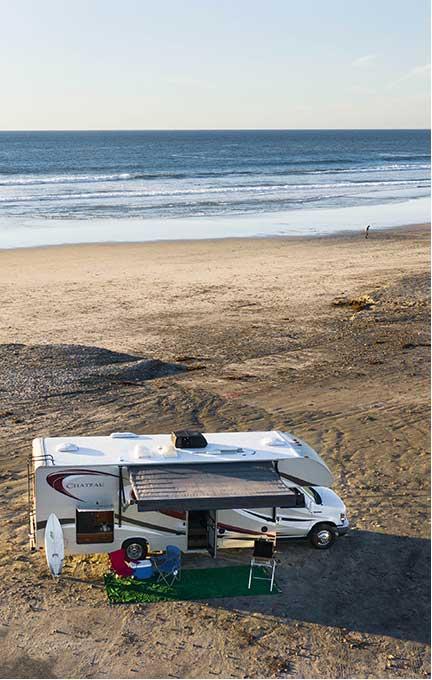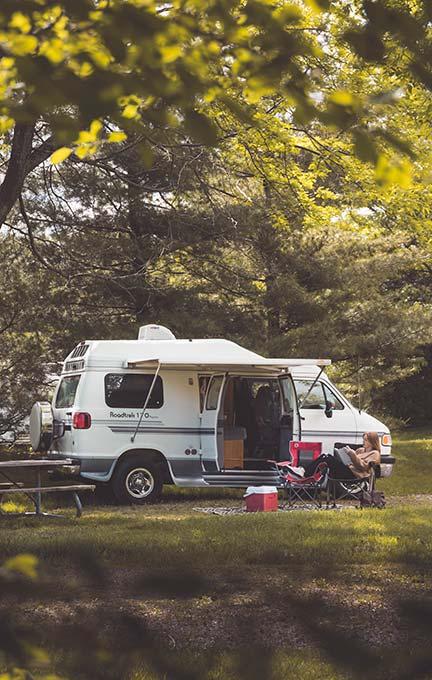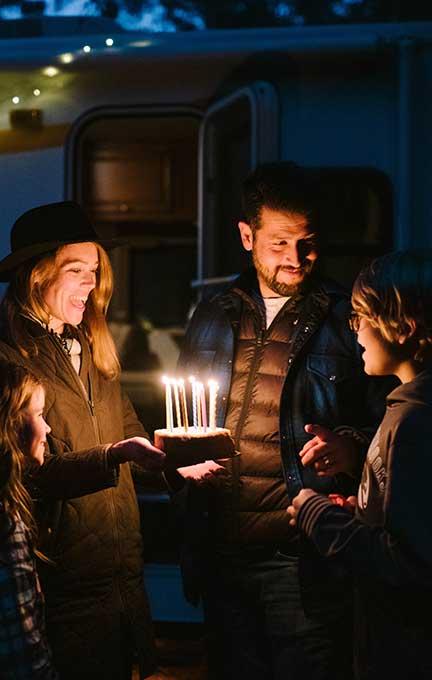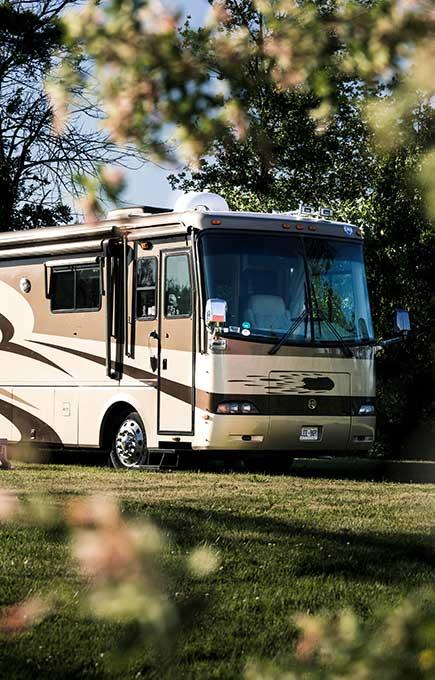Full-time RVing will teach you a lot, including the old adage that less is sometimes more. RVs are usually smaller than most houses, meaning you can’t just bring all of your belongings with you. This translates to a major downsizing effort when you first make the transition. But between deciding on what to keep, parting ways with cherished items, and figuring out what to do with the leftovers, downsizing isn’t always easy.
Our advice? Break the process down into smaller steps! Here are our nine downsizing tips for full-time RVer.
RVs For Rent Near You

Tip #1: Start early.
Just like the time it takes to build a home, downsizing your belongings will always take longer than planned. With that knowledge in mind, try to start as early as you can to plan for your first day of freedom. You don’t want to have to stuff half your belongings in your RV the day you set off for your first national park!
Tip #2: Know your RV.
Some prospective full-timers have yet to purchase their RV, campervan, or travel trailer. But if you are one of the lucky ones, you know just what you’re going to be living in on the road and how much storage space you’ll have. Knowing how much space you’ll be living in will come in handy when you’re trying to stuff a few of those beloved snow globes into nooks and crannies the day before you leave.
If possible, plan what types of items you’ll put in certain locations of your home on wheels. For instance, know that clothes will go in a shirt closet or drawers, food in pantries, etc. Also keep in mind what kind of exterior storage your vehicle may have and what items can be placed there. Brushing up on your RV organization skills will help you with this!

Tip #3: Make lists.
Make these three lists:
- Things you must keep like family heirlooms, photos, meaningful momentos, etc.
- Things you’d like to keep. Consider what’s negotiable and what items you could reasonably part with.
- Things you can’t keep. Categorize these into sellable items, donate items, and trash—and yes, we know that Beanie Babies collection may seem irreplaceable, but…
Eventually, you will have fewer things in your “must keep” list than you start with. Feel free to move items around on this list as you begin to realize what is really important to keep versus what you are willing to part with.
Tip #4: Give things away to friends and family.
Once your lists are finalized, ask immediate family or close friends if there is something they would like to have. Sometimes they will even volunteer to keep things for you—at least, in their words, “until you come to your senses and want to move back into a house.”
Many won’t understand your desire to change the course of your life, but I’ve found that most are willing to help you in this endeavor and will eventually warm up to the idea.
Tip #5: Sell high-value items separately.
Many things like furniture and art collections are valued at higher prices than you might expect to receive from a yard sale. So find a different way to sell them. For instance, auction houses specialize in furniture, china, jewelry, and artwork.

Selling these items on local apps like LetGo and Facebook Marketplace do well, as long as your description tells the buyer about their value. Most people who would purchase such pieces know the difference between a Stickley chair and that pleather sofa that’s been used at a college frat house. Tell them what a great deal they would be getting, mention the item’s approximate value, let them know about the great sales price you’d let them have it for.
Tip #6: Have a yard sale.
Everyone loves a bargain, and if you keep in mind that your goal is to get rid of stuff, people will find plenty of bargains at your yard sale.
Tip #7: Donate items to charity.
If you have some pieces that could be useful to local charities like Habitat Restore or Goodwill, donate them. Most will even come pick up your donations. Be sure to get a receipt for your goods, as your donations are usually tax-deductible.
Step #8: Place must-keeps in storage.
If you still have something you just can’t part with but don’t have room for in the RV, ask a friend if you can store a box in their basement or garage and offer them a bit of “rental” payment. If it’s more than a box or two, consider renting a storage space.

Tip #9: Let the other items go for free.
If you still have items left, put them on the curb with a sign that says “FREE”. If you want to go the online route, post them to Facebook Marketplace for free. You’d be surprised how fast these items will leave. If the items still aren’t gone or aren’t usable by anyone, consider simply chunking the items in the trash.
Making the Most of the Space You Have
Invest in Multipurpose, Nesting, and Collapsible Items
Maximizing limited space in an RV starts with choosing items that serve more than one purpose and/or store easily. Multipurpose items and items that nest or collapse reduce clutter and enhance functionality.
Versatile Linens
- Turkish Towels: Lightweight and quick-drying, these can be used as towels, blankets, shawls, or picnic mats.
- Foldable Bedding: Opt for compact blankets or convertible sleeping bags that double as throws during the day.
Clever Kitchenware
- Collapsible Bowls and Strainers: These flatten when not in use, saving precious cabinet space.
- Nesting Cookware: Pots, pans, and measuring cups designed to stack efficiently are ideal for small kitchens.
- Multi-Function Appliances: An Instant Pot can replace several devices, serving as a slow cooker, pressure cooker, and steamer in one.
Furniture with Built-In Storage
- Ottomans and Benches: Use these for seating and storage to keep extra linens, books, or tools hidden yet accessible.
- Convertible Tables: Coffee tables that can expand into dining tables or workspaces add flexibility without extra bulk.
Clothing and Accessories
- Convertible Clothing: Pack lightweight, versatile garments like zip-off pants, reversible jackets, or multi-purpose scarves.
- Space-Saving Hangers: Use tiered or cascading hangers to store multiple outfits in a single closet slot.
Look for Efficient Storage Options
Efficient storage is essential for maximizing space and maintaining organization in an RV. With a mix of creative ideas and smart products, you can ensure everything has its place while keeping your living area clutter-free.
Utilize Vertical Space
- Install adhesive hooks, magnetic strips, or hanging organizers on walls and cabinet doors to store items like utensils, keys, and toiletries.
- Add pegboards for versatile storage of tools, pots, or baskets in kitchens and workspaces.
- Use over-the-door organizers in bathrooms, closets, or kitchens for shoes, cleaning supplies, or snacks.
Maximize Cabinet Efficiency
- Add shelf risers to double storage capacity in cabinets, especially for dishes and pantry items.
- Install pull-out drawers to access deep cabinets more easily, reducing the hassle of rummaging for items.
- Use stackable bins to organize food, clothes, or supplies while maintaining a clear view of contents.
Optimize Hidden Storage Areas
- Use the space under beds or seating for seasonal clothing, extra linens, or large items. Vacuum-sealed bags or roll-out bins work well here.
- Check for overlooked storage spaces, like under stairs, inside ottomans, or behind couch cushions.
Magnetic and Modular Storage Solutions
- Attach magnetic spice containers to the fridge or walls to save pantry space.
- Use modular storage bins that can be reconfigured for changing needs, whether for food, clothes, or camping gear.
Downsizing for RV Life FAQ
Why is downsizing important for RV living?
Downsizing is crucial because RVs have limited space and weight capacities. Reducing your possessions helps create a comfortable, organized environment while staying within weight limits for safe travel.
How do I manage sentimental items?
Keep a few small mementos or items with significant personal meaning. Consider:
- Taking photos of larger keepsakes for digital storage.
- Sharing heirlooms with family or friends who can cherish them.
What about clothing and wardrobe downsizing?
- Pack based on lifestyle and climate. Use a capsule wardrobe with mix-and-match basics.
- Store off-season clothing in vacuum-sealed bags or hidden compartments.
- Keep shoes to a minimum, focusing on versatile pairs.
How do I handle seasonal or rarely used items?
- Rotate items seasonally, keeping the current season’s gear accessible.
- Use external storage compartments or rooftop carriers for infrequent items.
Can I store items off-site?
Yes! Renting a storage unit for non-essential belongings, like family heirlooms or items you may need later, is a common solution for RVers.
How do I handle books, DVDs, and hobbies?
- Switch to digital formats for books, movies, and music.
- Choose compact hobby tools or supplies, and focus on space-efficient activities like sketching or knitting.
How often should I reassess my belongings?
Regularly evaluate your possessions, especially after a season or significant life change, to ensure your setup aligns with your current needs.
New Lease on Life
As you reach the end of your downsizing project, you’ll begin to feel as though you’ve received a new lease on life—and when you finally hit the road, you’ll realize you have. There will be no need to buy a shotglass from every bar you visit or purchase a T-shirt from every street festival you’ll wander through. You now have no space for them! Better yet, you’ll begin placing more value on the memories you make and the people you meet along this new journey, rather than on collecting “things.”
Want more tips for full-time RVing? Connect with other full-time RV owners on our Outdoorsy RV Owner Community. Get questions answered on how you can make a great income from your RV when you’re not using it.








